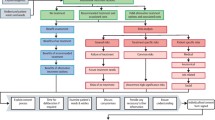Abstract
This article explores the patient consent process in modern community pharmacy practice and discusses the related ethical dilemmas in this environment. The myth of appropriately informed consent, and irrefutable evidence as to a pharmacist’s intentions when advising a patient, are core issues for discussion. The objective is to clarify where such dilemmas may exist in the consent process and to ultimately form a framework against which ethical guidelines might facilitate resolution of the dilemma faced by the pharmacist who is expected to simultaneously maintain legal and duty of care responsibilities in the patient consent process.
Similar content being viewed by others
References
Applebe, G. E., Wingfield, J., & Taylor, L. 2002, Practical Exercises in Pharmacy Law and Ethics. Pharmaceutical Press, London
Banyard, P. 1996, Applying Psychology to Health. Hodder and Stoughton, London
Beauchamp, T. L. (2003). Methods and Principles in Biomedical Ethics. Journal of Medical Ethics, 29, 269–274. doi:10.1136/jme.29.5.269
Bergen, B. A. (1993). Building an Effective Therapeutic Alliance: Competence, Trustworthiness, and Caring. American Journal of Hospital Pharmacy, 50, 2399–2403
Blenkinsopp, A. 2000, Health Promotion for Pharmacists. [2nd ed.] (Oxford University Press, Oxford)
British Medical Association: 2007, British National Formulary (BMJ Publishing Group Ltd and Royal Pharmaceutical Society Publishing, London), March
Chaar, B. (2006). Decisions, Decisions: Ethical Dilemmas in Practice (or How to Pass the ‹Red Face Test’). Australian Pharmacist, 25(6), 444–449
Cusack, D. A. 2000, Autonomy and Consent In: K. Kearon, F. O’Farrell (eds) Medical Ethics and the Future of Healthcare. The Columbia Press, Dublin, pp. 90–99
Denzin, N. K., & Mettlin, C. J. (1968). Incomplete Professionalization: The Case of Pharmacy. Social Forces, 46, 375–381. doi:10.2307/2574885
Gillon, R. 1985, Philosophical Medical Ethics. (John Wiley & Sons Ltd, London)
Haddad, A. M. (1993). Case Study: Keeping Confidences. American Pharmacy, 12, 50–52
Jackson, E. 2006, Medical Law. Text, Cases and Materials. (Oxford University Press, Oxford)
Kelliher, F.: 2007, `Small Firm Cooperative Constructs: Addressing Industry Power Relationships', Journal of Small Business and Enterprise Development 14(3), 501–513
Latif, D. (2000a), Ethical Cognition and Selection-Socialization in Retail Pharmacy. Journal of Business Ethics, 25(4), 343–358. doi:10.1023/A:1006097521228
Latif, D. (2000b), The Link Between Moral Reasoning Scores, Social Desirability, and Patient Care Performance Scores: Empirical Evidence from the Retail Pharmacy Setting. Journal of Business Ethics, 25(3), 255–269. doi:10.1023/A:1006049605298
Latif, D. (2001). The Relationship Between Pharmacists’ Tenure in the Community Setting and Moral Reasoning. Journal of Business Ethics, 31(2), 131–141. doi:10.1023/A:1010771103427
Manson, N. C., & O’Neill, O. 2007, Rethinking Informed Consent in Bioethics. (University Press, Cambridge)
McDowell, B. (1990). The Professional’s Dilemma: Choosing Between Service and Success. Business & Professional Ethics Journal, 9, 35–52
McDowell, B. 1991, Ethical Conduct and the Professional’s Dilemma: Choosing Between Service and Success. (Quorum Books, New York)
Ottewill, R., & Magirr, P. (1999). Changes in the Ownership of Community Pharmacies: Policy Implications. Public Money and Management, 19(2), 39–44. doi:10.1111/1467-9302.00164
O’Donovan L. J. 2000, A Profession of Trust: Reflections on a Fundamental Virtue In: D. Thomasma, J. Kissell (eds) The Healthcare Professional as Friend and Healer. Building on the Work of Edmund D. Pellegrino. (Georgetown University Press, Washington), pp. 1–8
Pellegrino E. D. 2000, Friendship as an Ideal for the Patient-Physician Relationship In: D. Thomasma, J. Kissell (eds) The Healthcare Professional as Friend and Healer. Building on the Work of Edmund D. Pellegrino. (Georgetown University Press, Washington), pp 28
Pharmaceutical Society of Ireland 1999, The Practice of Pharmacy Guide. A Handbook for Pharmacists on Law, Ethics and Practice. (Pharmaceutical Society of Ireland, Dublin)
Redman, B. K. (1995). The Ethics of Leadership in Pharmacy. American Journal of Health-System Pharmacy, 52, 2099–2104
Resnik, D. B., Ranelli, P. L., & Resnik, S. P. (2000). The Conflict Between Ethics and Business in Community Pharmacy: What About Patient Counselling. Journal of Business Ethics, 28(2), 179–186.. doi:10.1023/A:1006280300427
Rest, J. R., & Narvaez, D. 1994, Moral Development in the Professions: Psychology and Applied Ethics. (Lawrence Erlbaum Associates, Hillsdale, NJ)
Roche, C.: 2006, `Does Colocation of Prescribers and Dispensers in Primary Care Compromise the Patient's Right to Consent?', Irish Pharmacy Journal 142–146, May
Sanghavi, N. (1995). Pharmacy in a New Age Commercial Environment. Pharmaceutical Journal, 255, 615–618
Schmidt, R., & Pioch, E. (2004). Community Pharmacies Under Pressure: Issues of Deregulation and Competition. International Journal of Retail and Distribution Management, 32(7), 354–257. doi:10.1108/09590550410541471
Szeinbach, S. L., Barnes, J. H., Summers, K. L., & Benjamin, B. F. III (1994). The Changing Retail Environment: Its Influence on Professionalism in Chain and Independently Owned Pharmacies. Journal of Applied Business Research, 11(1), 5–15
Wick, J. Y., & Zanni, G. R. (2001). Informed Consent: What Every Pharmacist Should Know. Journal of the American Pharmaceutical Association, 41(4), 523–527
Wingfield, J., Bissell, P., & Anderson, C. (2004). The Scope of Pharmacy Ethics—An Evaluation of the International Research Literature, 1990–2002. Social Science and Medicine, 58, 2383–2396. doi:10.1016/j.socscimed.2003.09.003
Referred cases
Crawford v Board of Governors of Charing Cross Hospital [1953] CA
Geoghegan v Harris [2000] 3 IR 536
Laskey v Morton, Sutton and Wadsworth Health Authority [1999] 40 BMLR 18
Author information
Authors and Affiliations
Corresponding author
Rights and permissions
About this article
Cite this article
Roche, C., Kelliher, F. Exploring the Patient Consent Process in Community Pharmacy Practice. J Bus Ethics 86, 91–99 (2009). https://doi.org/10.1007/s10551-008-9836-7
Received:
Accepted:
Published:
Issue Date:
DOI: https://doi.org/10.1007/s10551-008-9836-7




